- Home
- Bonnye Matthews
Zamimolo’s Story, 50,000 BC Page 4
Zamimolo’s Story, 50,000 BC Read online
Page 4
Olomaru-mia just looked at him.
“Say my name,” he demanded.
She glared at him.
Mechalu was losing patience. He’d been kind to her. Once again, he said gentler, “Say my name.”
She looked away, and fast as a snake he struck her cheek hard.
“Say my name,” he growled.
She did.
“Say it again!” he insisted, poised to strike again.
She complied in tears.
He stood and pulled her by the hand to stand. He retied her hands behind her, but he put the gag in his bag. He pulled on the rope and the two continued down the mountain. By nightfall they’d reach a rock shelter with a cairn he’d built. It was located around the toe of another mountain. They would finally have a comfortable night.
Light came to the west side of the first mountain where Zamimolo and Linpint spent the night. As soon as they could see clearly, they gathered their backpacks and began to hike the rest of the way up the mountain. They quickly lost the track of the two they followed, but they reasoned that if they crested the hill they might see Olomaru-mia and her captor or captors. He hoped she’d make noise somehow to alert them, but she had never been taught what to do in such a case. No story told what the captive should do. They traveled upwards as quickly as they could. Part way up the hill, Linpint fell into a cave under tree roots. It had been obscured by the leafy vine ground cover in the forest. Linpint was in it to his arms. Zamimolo helped him out, and they continued.
In an area where no trees grew just a little higher on the hill, they stopped on the grass to have something to eat and some water. Linpint lay on his back looking at the heavy sky, noticing the smell of rain. Soon they’d be drenched. Zamimolo was grateful to be outside the heavy forest for a while. He didn’t care for the darkness and sense of foreboding he felt in a dense forest. A crashing noise brought both of the men to their feet. At the edge of the clearing, a huge ground sloth was pulling at a tree and it had fallen to lean on another tree. The tree hold wasn’t good, and soon the tree would crash to the ground. The tree didn’t bother them at all. The shaggy coated ground sloth was a great concern. The boatmen had warned them about these animals. The beasts could move at a rate almost as fast as a man could. They stood four times the height of a fully-grown man. Their nails were something to avoid. They could strike out with their arms at an alarming speed. Normally they ate plants, but some people said they also ate meat, taking over the kills of the long-tooth cat. Zamimolo and Linpint had no desire to verify that comment. Apparently, the sloth hadn’t detected their presence. They put on their backpacks just as the rain began to fall in huge drops.
They went back into the forest quietly and continued up the mountain. Rain abated briefly as they crested. The men called to Olomaru-mia. They called to each direction, first east, then south, then west, then north. They repeated the process several times. Each time they listened with great care. There was no return call, no rock fall such as a gagged hunter might create with an intentional kick. Nothing. All seemed to be a forest without people. There was no indication anywhere that would lead them to Olomaru-mia. They decided that when they returned to the People they’d insist that all People learn the things hunters do if they were lost, so if they were stolen they’d know how to alert followers with signs or sounds. The men were dismayed in the present. Mountains continued seemingly forever. Olomaru-mia seemed to have vanished.
Zamimolo stood looking eastward. The Wise One had said to go east. He looked at Linpint, “How can I hope to find her in this forested mountainous land? I feel dispirited. I sense defeat. And the forest noise here is deafening!”
“We have hardly tried yet, my friend. Let’s continue over the side of this mountain to see if we can find a place to spend the night. There are ways to find her. Perhaps we’ll find other people living here who can help us. Don’t give up so easily.”
Mechalu led Olomaru-mia around the toe of the final mountain of the day. It was dusk. It would be fully dark by the time they reached their destination. He was eager to reach his rock shelter and cache. It was the place he had spent much of his time since he’d been on his test of manhood valor. He’d been gone for a long time. In this specific place, however, he had come to feel at home, though it was a long way from his real home. Olomaru-mia was extremely tired. Her foot had been seriously injured on a sharp stick, and it continued to bleed. She walked on it almost relishing the pain, hoping to hasten her death by blood loss. Mechalu had been striving to reach his place and did not stop often. When they did stop, she had eaten nothing, burying the food she’d been given in the vegetation where they’d stop, when Mechalu was looking elsewhere. She carefully concealed the foot injury, hoping Mechalu would not smell the blood.
At dark, when Olomaru-mia could not see well, Mechalu pointed to the rock shelter. He’d made places inside the protective cover of rock to sit and even to sleep. Skins were laid over branches that were designed to keep the sleeper off the ground. He led her to a place to sit while he began to spin wood between his hands to create a spark for a fire, anticipating a warming fire in the firepit. Firewood had been placed in stacks around the rock shelter. Mechalu was so intent on what he did that he neglected to untie her hands or remove the gag. Olomaru-mia no longer wept. She wanted to die and would do whatever she could to hasten the process. And when she reached Wisdom, she wanted to ask why this had been permitted to happen. She felt empty. Few thoughts crossed her mind web. The sound of the fire starter barely reached her. The constant forest noises no longer caused her great alarm. She faded.
Mechalu got the ember and blew it into flames. He set what he carried in his hands carefully under the logs he had stacked, ready for his return. The fire in the pit he’d dug and surrounded with rocks came to life from a tiny ember. In a short time a real fire was burning and he could see. Mechalu turned to Olomaru-mia and realized she looked terrible. No longer was there anger, but in its place was an emptiness that disturbed him. Something wasn’t right. He realized she was still gagged and her hands were tied. He went to her and remedied the things he had neglected. She was lifeless. Her cheeks were bright red.
“What’s the matter?” he asked.
She was silent. This was different, he noticed. It wasn’t like her intentionally ignoring him earlier in the day, flaring at him from anger. She was just not there. It sent an alert resounding through Mechalu that he could not ignore. First, he smelled and then he saw the blood and realized her foot was badly injured. He wondered how much blood she’d lost. Mechalu got a wooden bowl he’d made and ran to the pond. He filled the bowl and put it near Olomaru-mia. He took a small pouch from his backpack. He put her foot in the bowl and washed it thoroughly, noticing that she hardly flinched when he pressed on the wound to clean it out. He knew it should hurt severely. He also noticed that her skin was very hot as from a fever, not exertion. He guessed that she’d had the foot injury for quite some time, but she hadn’t let him know. He took some skins and dried her foot. He reached into his bag and pulled out a tiny leather folded pouch. Inside were two bone needles. He took some hair that he’d removed from a horse neck a while ago. He threaded the needle and holding her foot so she couldn’t move it, he sewed the wound together. She barely showed that she felt it. Mechalu took a pinch of herbs from his pouch. He opened the folded neck of another pouch and extracted some honey directly onto the wound. He sprinkled the herbs on the honey. Then he brought the leather up to her foot and pressed the herbs and honey against the wound. He wrapped the soft leather around her foot and tied the wrap with narrow strips of leather. He wrapped the whole foot and tied it securely.
Mechalu went to his bed and checked the bedding to be sure that no snakes or spiders were lurking among the branches or skins. He laid Olomaru-mia on the bed. He got a bag, went back to the pond, and filled the bag. He returned and hung the bag on a piece of rock that stuck out from the wall. Olomaru-mia seemed to be sleeping. He removed the tunic that Olomaru-mia was wearing and took a piec
e of soft leather from his cache and wet it in the bag. He laid the wet leather on her chest, hoping to reduce her fever. She lay there as if in another world. Mechalu was worried that his valor prize might not survive. He got another piece of leather, wet it, and put it on her body from the ribs to her knees. Mechalu took the remains of the water and tried to dribble some into her mouth. That was very slow but successful. He had forgotten his hunger. All he sought was to heal her.
He lifted the leather piece off her chest and fanned her with it. He noticed that her nipples were pink, not the dark brown with which he was familiar. It made him smile. He re-wet the cloth, put it back in place, and then did the same with the other piece of leather. He stared at her in the firelight while he fanned her. Her pubic hair was the light reddish golden color of the hair on her head! He had never seen such a thing. He was shocked that he hadn’t noticed earlier. It was uncharacteristic for him to miss something like that. He lifted her arm. Her underarm hair was also light. He could even see bluish blood vessels through her skin. He wanted to touch her, but he restrained himself. He intended to join with her. For no reason that he could explain, he blushed. He could feel it coming, and it was a significant blush. He was grateful that nobody had observed him. He lifted her hands and noticed that one of the knuckles on her left hand was stiff. He couldn’t bend the finger at the place of stiffness without breaking it. He wondered at it as a curiosity. He covered her back with the wet skin and sought something to eat. Jerky would suffice, he decided. After he ate, he dribbled more water into her mouth. He wanted to be sure that she had plenty of water, even if it took all night.
Olomaru-mia stirred. She saw him through slitted eyes fanning her with a wet piece of leather, which dripped water onto her skin. She was shivering. Her mind web could not piece together what was happening, and she drifted back to sleep. Over the days that followed, she regained consciousness briefly and saw Mechalu taking care of her. She still had difficulty understanding where she was, why she was there, and where the People were. Before she could do much reasoning, she would fall back into fitful, feverish sleep, amidst the noise of monkeys, birds, and bugs. So much noise.
Meanwhile, the People had packed up and moved for safety to the mountain site discovered earlier by Tukyatuk and Grakumashi. The cave was adequate for the present, but if the group grew, they would have to look elsewhere. Water from the pond was good, but they soon expanded water-catching small channels in the rock of the cave exterior to channel rain into containers made from carefully sewed leather skins. For drinking they preferred the rainwater. Wildlife abounded on the flat land below them and from their vantage point, they could easily see where the hunters should go for meat. The camel was the most abundant grazer below. They were not hard to harvest, not like the elephants or giant armadillos. The armadillos had either spiked tails or smooth, fat tails. They had managed to kill a few, but the meat of the camel had far greater appeal and was much easier to spear. They also really liked the taste of the animal that resembled the rhino, but it was a snarly beast and not at all easy to spear.
Colitoba sat on the stone by the hearth. Her gaze was unfocused. She toyed with a piece of split leather at the bottom edge of her tunic.
Meninkua squatted beside her. “You still hurt?” Meninkua’s long dark graying hair shone in the light, her dark brown eyes filled with sympathy. The People had all loved Olomaru-mia.
“Of course. The Wise One said she would not be found until she has white hair and by then she will no longer be the same person we know. How could I lose my precious daughter so fast? I fear what is happening to her.”
“No one could have known this would happen. There were no signs of human life around the area where we chose to camp. Hunters checked it long before dark. It had to have been done stealthily. But the Wise One said she’ll be treated well.” Meninkua brushed off some small biting insects.
“Sometimes I wonder if he really knows.”
“Don’t search for trouble, my friend. The Wise One wouldn’t say that unless the Spirit of Wisdom told him.”
Colitoba looked up. “I know. It’s just hard not to worry. She has been such a good child and you and I know what mostly happens to girls who are stolen.”
“Maybe the Wise One knows that this is somehow different.”
“I sincerely hope so.”
“Come, my friend, we can find some greens for tonight.”
“Let me get the leather sling for carrying Picota,” she replied getting up. “I’ll be ready then.” She knew she had to do her part for the People.
The two women and their daughters, Molar and Flanilk, followed the women down the hill in search of supplementary greens for the night meal. They waved at Folifilo, the youngest of the four eldest wives. She had speared some fish and was bringing them up to the cave as they descended. The fish were threaded through the mouth and gill on a thin rope. Meninkua estimated that there were at least ten fish.
Down on the flat land the women observed the young children practicing with slingshots at leather targets. Kih, Meninkua’s eldest son, was overseeing the slingshot practice. Obi was watching the spear practice of the older children. Across the flat land to the north, they could see that someone had speared a camel and was far along in the butchering process. This place seemed good.
By a small creek Jup, Colitoba’s eldest son, and his wife, Gifi, sat with their feet in the water. Gifi’s face was drawn.
“I’m still frightened,” she said with her shoulders held up high.
“Now that we have our home, there is no need, sweet Gifi. The lookouts will assure that nobody creeps up on us now.”
“But with Olomaru-mia it was so fast. She would have fought. It seems she had no way to know anyone was there or to resist.”
“My dear, you make the choice. Either you live your life in fear or you don’t. Fear is no longer reasonable. You can choose to turn loose of the fear.”
“How?”
“Just trust.”
“Trust?” Gifi was dumbfounded.
“Trust the lookouts, the hunters, the fact that no tracks have been found so there are not many of these people. Keep your nose, eyes, and ears aware of your surroundings as you do anyway for snakes and wild animals. Then, there is no need to fear. We hunters think it was a single person who happened to see us land, who waited until dark, took Olomaru-mia, and then left to return to his people, wherever they live—which isn’t near here, or we’d see traces of their hearth fires. You are as safe as you can be. Nobody is ever completely safe. Just go ahead and live your life fearlessly, for you can now.” He put his arm around her.
“You aren’t afraid?”
“Not as soon as we moved here. I’ve seen the lookout places. You can see all directions. We put the people who see the best there. We are as safe as we were back home.” He hugged her to him.
“I’ll try.”
“My wife, I ask you to live fearlessly—not try. When you say, ‘I’ll try,’ you give yourself the ability to continue in fear. Declare to yourself that you’ll live fearlessly. Then do it. It’s something you must control.”
She reached for his hands and held them. She searched his face, coming to rest on his dark blue eyes. “I will live fearlessly.” She filled herself with determination.
The two embraced and then returned to the chores they’d been doing.
In the mountains, Zamimolo and Linpint had awakened and begun to continue to the east following a path that seemed recently used. At their movement, howler monkeys set off amazing, seemingly endless cacophony of ear splitting sounds. The men looked at each other and shrugged. The path led to another path that was clearly one used by people, and they were encouraged. Human evidence was not recent, but they hoped it would lead to people who could give them directions where to look. It led northeast to a river showing traces of human presence. The men followed the river to a valley, which in six days brought them to the sea. The sandy beach was lovely. If they stood facing the water, to their righ
t a good distance away was a hill rising from the sand. The same was true of the view to the left. They realized that the shore consisted of both sandy beaches and hillsides at the water’s edge. They knew this sea was a different sea from the one they crossed to the new land. As hunters, they knew the direction they had traveled. They realized the land they had chosen for this migration was a narrow land.
They agreed to travel on, keeping the sea to their right. Keeping the sea to their right was more to the east than heading in the other direction, which seemed to head toward the south, and their choice seemed tied to human use. They hoped to find some people who could give them guidance on where to look for Olomaru-mia.
Back at the rock shelter Mechalu was still greatly concerned. He had left Olomaru-mia briefly to hunt and had returned with a camel. He had butchered it and had the meat cooking. He cleaned up at the lake and returned to find Olomaru-mia sitting up looking confused.
“How are you feeling?” he asked.
“I have seen you taking care of me. Who are you?”
“I am Mechalu. We have traveled a long distance together. You injured your foot. You seem better now.”
Olomaru-mia looked at her foot and realized she was undressed.
“Where is my tunic?” she asked horrified.
“Here,” Mechalu handed it to her.
“Why did you take my tunic?” she asked.
“Because you had a high fever and I had to soak you with wet cloths.” Mechalu assessed the situation. She looked terribly weak and he wasn’t at all sure that she was well yet. He squatted beside her and put his head against hers. “Your fever has gone,” he said.
She realized she had leather circles threaded with leather through slits tied to her hands.
“What is this?” she asked indignantly. “Get this off me!”
“Shhhhhh,” he took her by the shoulders and laid her back down gently.
She resisted with every bit of energy she had, which was very little.

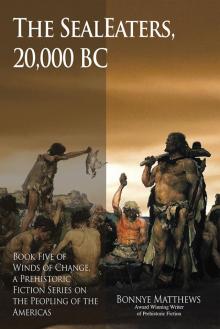 The SealEaters, 20,000 BC
The SealEaters, 20,000 BC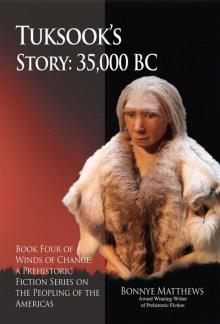 Tuksook's Story, 35,000 BC
Tuksook's Story, 35,000 BC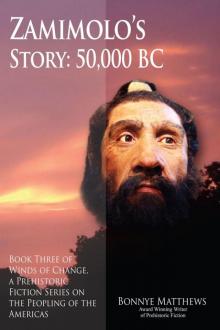 Zamimolo’s Story, 50,000 BC: Book Three of Winds of Change, a Prehistoric Fiction Series on the Peopling of the Americas (Winds of Change series 3)
Zamimolo’s Story, 50,000 BC: Book Three of Winds of Change, a Prehistoric Fiction Series on the Peopling of the Americas (Winds of Change series 3)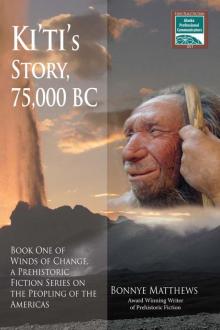 Ki'ti's Story, 75,000 BC
Ki'ti's Story, 75,000 BC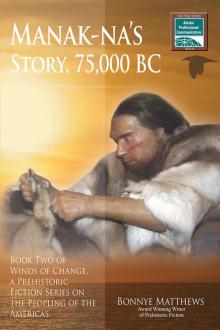 Manak-na's Story, 75,000 BC
Manak-na's Story, 75,000 BC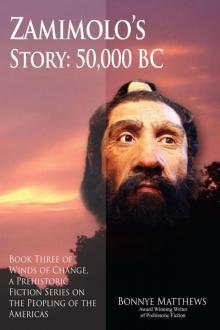 Zamimolo’s Story, 50,000 BC
Zamimolo’s Story, 50,000 BC